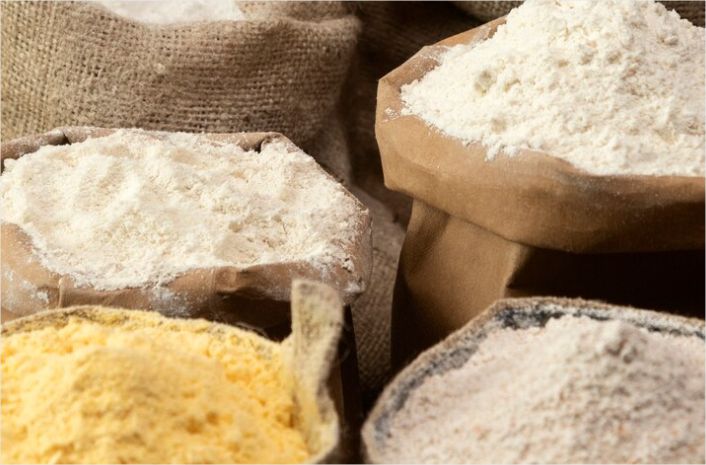Cassava flour vs all-purpose flour: Uncover the key differences between these flours, their ideal uses in recipes, and which one best suits your specific preferences.
Choosing the right flour for your cooking or baking can feel like a challenge, especially with so many options available.
Cassava flour and all-purpose flour are two popular choices, but they each have their benefits.
All-purpose flour is a kitchen staple, familiar, and easy to work with. Cassava flour, on the other hand, is gluten-free and packed with nutrients, making it a great alternative for those with dietary restrictions.
In this post, we’ll break down the differences between these flours, and their ideal uses, and help you figure out which one suits your needs and recipes best.
Related: Comparing Cassava Flour with Wheat Flour
Table of Contents
- An Overview of Cassava Flour and All-purpose Flour
- Cassava Flour vs All-Purpose Flour: Nutritional Comparison
- Flavor and Texture Differences
- Cooking and Baking Considerations
- Gluten Content and Dietary Considerations
- Cost and Availability
- Best Uses for Each Flour
- Which Flour Should You Choose?
An Overview of Cassava Flour and All-purpose Flour
Cassava flour is made from the cassava tuber. It’s gluten-free and grain-free, making it a great choice for those with dietary restrictions.
The root is processed into a fine powder, resulting in a flour with a mild, earthy flavor. It closely resembles wheat flour in texture, which makes it a good substitute in many recipes.
However, cassava flour absorbs more liquid than regular flour, so you may need to adjust your recipes.
All-purpose flour, on the other hand, is a refined wheat product made by milling a blend of hard and soft wheat grains. It contains gluten, which provides structure and chewiness to baked goods.
All-purpose flour has a neutral taste, making it suitable for a wide range of recipes, though it’s not an option for those avoiding gluten.
Related: Cassava Flour vs Regular Flour
Cassava Flour vs All-Purpose Flour: Nutritional Comparison
Understanding the nutritional differences between these flours can help you decide which best suits your dietary goals.
| Nutrient | Cassava Flour (per 100g) | All-Purpose Flour (per 100g) |
|---|---|---|
| Calories | 357 kcal | 364 kcal |
| Carbohydrates | 84g | 76g |
| Fiber | 3g | 2.7g |
| Protein | 1.4g | 10.3g |
| Fat | 0.6g | 1g |
Cassava flour is higher in carbohydrates and slightly richer in fiber, making it a dense source of energy.
However, it lacks protein, which is where all-purpose flour has the advantage. The gluten in wheat flour contributes to its higher protein content, which is essential for building structure in baked goods.
Related: Recipe for Cassava Palm Cakes
Flavor and Texture Differences
Cassava flour has a mild, slightly sweet taste with a fine texture. It tends to make baked goods denser and chewier since it lacks gluten.
Because it absorbs more liquid than wheat flour, recipes may need modifications to prevent dryness.
All-purpose flour, in contrast, has a neutral flavor and a softer texture. It creates light and airy baked goods due to its gluten content, which allows the dough to stretch and rise.
If you’re baking bread or pastries that require elasticity, all-purpose flour is the better option.
Related: Cassava Flour vs Coconut Flour
Cooking and Baking Considerations
If you’re substituting cassava flour for all-purpose flour, adjustments are necessary to achieve the right consistency. Here are a few tips:
- 1:1 Substitution? While cassava flour can replace all-purpose flour in equal amounts in some recipes, it absorbs more moisture, so you may need to add extra liquid.
- Binding Agents: Since cassava flour lacks gluten, adding eggs, xanthan gum, or other binders can help maintain structure.
- Texture Adjustments: Expect a denser texture in baked goods when using cassava flour. For a lighter texture, blending it with other gluten-free flour can help.
All-purpose flour works seamlessly in most recipes, requiring no modifications. However, for those avoiding gluten, cassava flour or other alternatives are necessary.
Related: Cassava Flour and Almond Flour: How Do They Compare?
Gluten Content and Dietary Considerations
One of the biggest differences between these flours is their gluten content. If you have celiac disease or gluten sensitivity, cassava flour is a safe choice. It allows you to enjoy baked goods without triggering adverse reactions.
All-purpose flour, however, is not suitable for gluten-free diets. The gluten in wheat flour gives dough its elasticity, making it essential for traditional bread and pastries.
Those with gluten intolerance should opt for alternatives like cassava, almond, or coconut flour.
Recommended: How to Make Cassava Flour
Cost and Availability
All-purpose flour is widely available and typically more affordable than cassava flour. Its large-scale production keeps costs low, and it’s found in nearly every grocery store.
Cassava flour, on the other hand, can be pricier due to its specialized production process.
Availability may vary depending on location, but it’s commonly found in health food stores and online retailers. If you’re on a budget, all-purpose flour remains the more economical choice.
Best Uses for Each Flour
Knowing when to use cassava flour versus all-purpose flour can help you achieve the best results in your recipes.
Here’s a table comparing what each type of flour works well for:
| Cassava Flour Works Well For | All-Purpose Flour Works Well For |
|---|---|
| Gluten-free baking (cookies, cakes, and pancakes) | Traditional baking (breads, cakes, and pastries) |
| Thickening soups and sauces | Pasta and noodles |
| Making tortillas and flatbreads | Thickening sauces and gravies |
| Paleo and grain-free diets | Frying and coating foods |
Which Flour Should You Choose?
The choice between cassava flour and all-purpose flour depends on your dietary needs and cooking preferences.
- Choose Cassava Flour if you follow a gluten-free, paleo, or grain-free diet.
- Choose All-Purpose Flour if you want a budget-friendly, versatile flour that works in most recipes without modifications.
Both flours have their advantages, and understanding how they function will help you decide which one fits your lifestyle best.
Whether you’re baking bread, making pancakes, or thickening a sauce, knowing the strengths of each flour ensures success in the kitchen.

Chimeremeze Emeh is a writer and researcher passionate about Africa’s most transformative root crop—cassava. Through his work at cassavavaluechain.com, he explores the entire cassava industry, from cultivation and processing to its diverse applications in food, health, and industrial use.
He also writes for palmoilpalm.com, where he shares his extensive experience and deep-rooted knowledge of palm oil, covering red palm oil, palm kernel oil, and refined products. His work there reflects his lifelong connection to agriculture and his commitment to promoting sustainable value chains in Africa.
Driven by curiosity and purpose, Chimeremeze aims to shed light on how cassava continues to empower communities, strengthen food systems, and link traditional farming wisdom with modern innovation.

